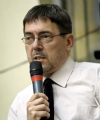Professor Graziano Presents at SUNY's International Conference on the Mediterranean |
| Monday, 14 December 2015 |
|
The objective of the conference was to exchange ideas and pursue a reflection on the importance of recognizing the identity of the Mediterranean basin as a region with an original culture beyond the fragmented cultures that compose it: "The Mediterranean is the cradle of civilizations with a unique history of having given birth to all the Western cultures, to three world-wide religions, and to opening pathways to the Orient. An organic and autonomous Mediterranean identity may not exist as such today; but in the collective imagination of the people of the world and especially in the last two centuries with migrations from the Mediterranean area settling throughout the entire world, there exists a "popolo mediterraneo." Globalization has made evident the importance of preserving culture and the development of a consciousness that especially constitutes a matchless resource for the nations of the Mediterranean, and which the new Europe cannot do without." (Stony Brook University's conference website) In December, Professor Graziano also headed a seminar on Geopolitics of Religions at Department of Political Science of the Universiy of Turin in Italy. The seminar included a general introduction to the geopolitics of religions and a special course on Islam, as well as a roundtable with other professors, organized by the PIero Calamandrei Center in Turin. |
Contact Us

Robert SimmonsUnited States
|

 On November 12th-14th, Professor Manlio Graziano participated in an international conference on the Mediterranean region hosted by the State University of New York (Stony Brook University). His paper, entitled " 'Mare Nostrum' in a Multipolar World: Geopolitical Analysis of a Superfluity of Claims", provided a geopolitical approach to the Mediterranean region's diversity and commonalities. Other participants included international Mediterranean Studies scholars from universities in the United States (Princeton, Columbia, UCSB, San Diego State), France, Italy, and others, along with writers, government officials, and UN Ambassadors.
On November 12th-14th, Professor Manlio Graziano participated in an international conference on the Mediterranean region hosted by the State University of New York (Stony Brook University). His paper, entitled " 'Mare Nostrum' in a Multipolar World: Geopolitical Analysis of a Superfluity of Claims", provided a geopolitical approach to the Mediterranean region's diversity and commonalities. Other participants included international Mediterranean Studies scholars from universities in the United States (Princeton, Columbia, UCSB, San Diego State), France, Italy, and others, along with writers, government officials, and UN Ambassadors.
 Moving to Paris has taken a top rank amongst the most challenging things I have experienced in life so far. AGS – the classes, my colleagues, and the school staff – provided for me a sanity that I had lost! This program is phenomenal and is giving me opportunities to do some really cool things, such as being invited to intern for a summer at a school/community outreach program in Tanzania.
Moving to Paris has taken a top rank amongst the most challenging things I have experienced in life so far. AGS – the classes, my colleagues, and the school staff – provided for me a sanity that I had lost! This program is phenomenal and is giving me opportunities to do some really cool things, such as being invited to intern for a summer at a school/community outreach program in Tanzania.